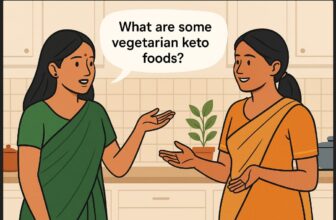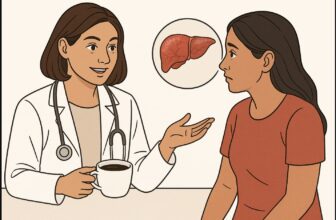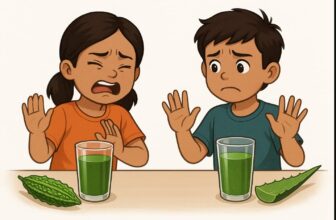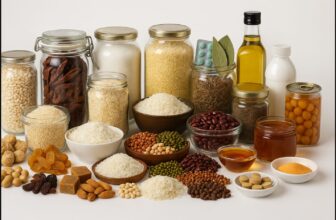The food you eat daily influences how quickly your body shows signs of aging. While genetics play a role, lifestyle and diet account for a significant share of how your skin, energy levels, and internal organs age over time. In India, traditional diets once rich in whole grains, seasonal fruits, and fresh vegetables are increasingly being replaced by processed, sugary, and oily foods. This dietary shift accelerates wrinkles, fatigue, and lifestyle diseases such as diabetes and hypertension, all of which contribute to faster aging.
This guide highlights 15 commonly consumed foods in India that speed up the aging process, along with clear alternatives you can adopt to slow it down.
Sugar-Loaded Habits That Weaken Skin
1. Why daily sweets and sugary tea damage skin collagen
Refined sugar contributes to glycation, a process where sugar molecules attach to proteins like collagen and elastin, breaking them down and leading to wrinkles and sagging skin. In India, sugar intake is higher than recommended, especially during festivals when mithai and desserts are consumed daily. Even tea often contains two to three spoons of sugar per cup. Replace refined sugar with jaggery, stevia, or honey (in moderation). Gradually reduce sugar in chai and opt for fruits to satisfy cravings.
2. Soft Drinks and Packaged Juices – How bottled beverages speed up wrinkles and dullness
Soft drinks contain high-fructose corn syrup and added sugars that spike insulin levels, dehydrate the skin, and weaken elasticity. Packaged juices, even when marketed as healthy, are often filled with preservatives and added sugar. Choose fresh lime water, coconut water, or buttermilk. Carry seasonal fruits instead of buying bottled juices.
Fried and Instant Snacks That Harm Body Cells
3. Fried Snacks (Samosa, Pakoras, Namkeen, Bhujia)
These foods are usually fried in reused oil, which forms trans fats. Trans fats trigger inflammation in the body, accelerating cellular damage and making the skin look older. Evening tea-time snacks like pakoras and namkeen are an everyday ritual in many households. Use air fryers or bake snacks at home. Opt for roasted chana, peanuts, or sprouts.
4. Instant Noodles and Packaged Chips
Instant noodles and chips are loaded with sodium, artificial flavorings, and refined flour. Regular consumption increases oxidative stress in cells, contributing to early aging. Among students and office-goers, instant noodles are a common quick fix meal, but frequent use takes a toll on long-term health. Replace with homemade poha, upma, or roasted fox nuts (makhana).
Refined Grains That Spike Blood Sugar
5. White Bread and Maida-based Foods (Naans, Bakery Items)
Maida has a high glycemic index, causing blood sugar spikes and eventual collagen breakdown. Bakery biscuits, pav, and cakes are staples in urban diets. Over time, they can cause both weight gain and dull skin.
Switch to whole wheat, multigrain, or millet-based alternatives. Choose atta biscuits or khakhras over maida-based bakery products.
6. White Rice (Polished Rice)
Polished rice lacks fiber and essential nutrients, leading to rapid blood sugar fluctuations. Regular high-GI foods are linked to premature aging and higher diabetes risk, especially in India where white rice is a staple in the South and East.
Mix polished rice with brown rice or hand-pounded rice. Add millets such as foxtail millet or barnyard millet to your diet for variety.
Excess Salt and Preserved Foods
7. Pickles and Papads
Pickles and papads, though traditional, often contain excess salt. High sodium intake causes dehydration, puffiness, and fine lines. Consumed daily with meals, they silently raise blood pressure and stress your organs. Limit intake to occasional use, prepare low-salt homemade versions, or replace with fresh salads and chutneys.
8. Processed Meats (Salami, Sausages, Cold Cuts)
Processed meats contain sodium nitrites and preservatives that damage tissues and speed up aging. While not traditionally Indian, their consumption is rising in metros. Replace with fresh paneer, tofu, lentils, or sprouts.
Creamy and Oily Food Favorites That Burden the Body
9. Street Food (Pav Bhaji, Chole Bhature, Kachori)
These dishes are heavy in butter, refined oil, and salt. Regular consumption leads to clogged arteries, breakouts, and sluggish metabolism. Indian street food culture makes these items irresistible, but they carry long-term health costs. Eat them occasionally, cook versions at home using less oil, or opt for lighter traditional meals like idli-sambar.
10. Excess Dairy-based Desserts (Rabri, Rasmalai, Peda)
Combining sugar and saturated fat, these desserts create a perfect recipe for inflammation and skin dullness. Indian festivals and weddings often include dairy-heavy desserts in large quantities. Choose fruit salads, kheer made with jaggery, or small portions of lighter sweets.
Alcohol and Caffeine – Drinks That Dry Out and Disturb Balance
11. Alcohol (Beer, Whisky, Cocktails)
Alcohol dehydrates the body and skin, leading to wrinkles and dullness. It also impacts liver function, which in turn affects detoxification and skin clarity. Consumption is rising in Indian metros, particularly among young adults. Limit alcohol to occasional intake, stay hydrated by drinking extra water, and balance with antioxidant-rich foods.
12. Excess Tea and Coffee with Milk and Sugar
Caffeine in excess dehydrates the skin, while added sugar and milk worsen glycation. With most Indians drinking multiple cups of tea or coffee daily, the cumulative impact on skin and energy levels is significant. Reduce cups gradually, opt for black tea, green tea, or unsweetened black coffee. Replace at least one cup with herbal tea.
Sweet and Packaged Desserts – Sugary Treats That Damage Collagen
13. Ice Cream and Kulfi
Ice creams contain a combination of sugar, fat, and preservatives that damage collagen and increase fat deposits. Kulfi, though traditional, is equally dense in sugar and cream. Replace with frozen fruit popsicles, fruit smoothies, or smaller portions once in a while.
14. Bakery Cakes and Pastries
These contain maida, sugar, and hydrogenated oils, forming free radicals in the body. As a staple for birthdays and celebrations, they often become a frequent indulgence. Bake at home using atta and jaggery or celebrate with fruit platters.
Overcooked and Burnt Foods – Cooking Practices That Produce Toxins
15. Charred Tandoori Foods (Overcooked Kebabs, Tikkas)
When foods are cooked at very high temperatures or burnt, they form compounds called Advanced Glycation End-products (AGEs). These accelerate skin aging and internal inflammation. Tandoori dishes, if overcooked, fall into this category. Cook foods at moderate temperatures and avoid eating the burnt or blackened parts.
Aging Is Natural – But Food Choices Decide the Pace
The foods that accelerate aging often overlap with those most loved in Indian households, sweets, fried snacks, and festival delicacies. You don’t have to eliminate them completely, but reducing frequency, portion size, and choosing healthier cooking methods can make a visible difference. Substituting refined and processed foods with fresh vegetables, lentils, seasonal fruits, millets, and traditional recipes can slow down premature aging.
Aging is inevitable, but in your control is how gracefully it happens. Choosing whole, balanced foods in your daily routine is the simplest way to look and feel younger for longer.





